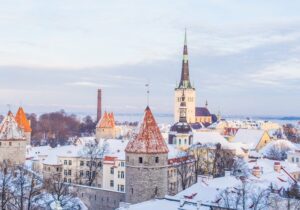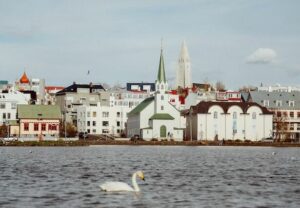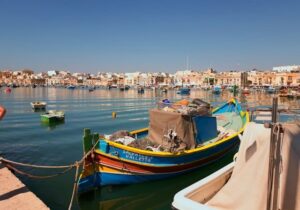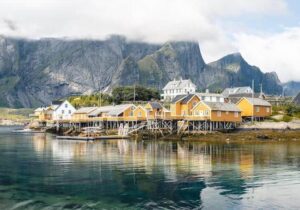Economies worldwide suffered during the pandemic, which drove countries across Europe and the globe to launch new visas to nourish their own. These new visas are typically geared toward foreign remote workers and are commonly referred to as Digital Nomad Visas. As every nation has its own set of regulations regarding its permit, we will walk you through the Digital Nomad Visas in Europe.
What is a Digital Nomad Visa?

The Digital Nomad Visa Program is a long-term visa that grants residency rights to foreigners who can do their work remotely and are not employed by a company or entity registered within the respective country where they’re applying. The residency period ranges, on average, between six months to two years and can be subject to extension.
The advantage of having a Digital Nomad Visa is that you can acquire residency in a country without investing in it, and often, you are not required to be a registered tax resident. However, tax residency depends on every government’s regulations and sometimes on how long you maintain residence.
The Digital Nomad Visa versus the Tourist Visa
The difference between Digital Nomad Visas and Tourist Visas is vast and clear – one permits entry and stay for a limited time, and the other grants long residency rights. A Tourist Visa allows individuals visitation rights for up to three months every 180 days in a specific nation or area. Digital Nomad Visas grant extended residency rights to highly skilled workers for a period over 90 days up to a year, with the possibility of being extended.
Eligibility Requirements for the Digital Nomad Visa
Every nation has its own set of rules and regulations regarding its permit. However, they all share similar general requirements that determine whether or not an individual is eligible to obtain a visa.
The general requirements are:
- Applicants must be foreign citizens with clean criminal records.
- Applicants must have remote work contractual agreements with clients or entities based and registered outside the respective nation to which they’re applying.
- Applicants must be capable of providing their services remotely using digital technology.
- Applicants must have adequate health insurance to cover their residency.
- Applicants must have a valid passport.
- Applicants must meet the minimum monthly income determined by the respective country to cover their cost of living.
What to Look for in a Digital Nomad-Friendly Country
When considering a country’s suitability for digital nomads, it’s essential to evaluate several key factors that will ensure both productivity and a fulfilling lifestyle. By assessing these factors carefully, digital nomads can choose a destination that not only enhances their work efficiency but also fits their lifestyle preferences. This helps ensure a rewarding and sustainable digital nomad experience.
Internet Reliability: For digital nomads, having high-speed and reliable internet is essential. It’s important to ensure that your destination offers strong connectivity as your work will depend on it. Check for Wi-Fi availability in accommodations, cafés, and coworking spaces.
Cost of Living: Living in an affordable country can help you save more money, while enjoying a better standard of living. This includes low-cost accommodation, food, transportation, and leisure activities. Countries in Southeast Asia, Eastern Europe, and some in Latin America are well-known for their affordability.
Visa and Legal Requirements: It is important to research countries that offer digital nomad visas or extended tourist visas for long-term stays. Understanding tax obligations and work requirements is also crucial.
Safety and Healthcare: Safety is a top priority when choosing a place to live or work. Access to quality healthcare is also important for longer stays and emergencies.
Community and Networking Opportunities: Existing digital nomad communities provide support and collaboration opportunities, making the transition easier and enhancing the experience.
Climate and Lifestyle: Personal preferences in climate, lifestyle, and location significantly affect satisfaction and productivity.
Language and Cultural Barriers: Considering language and culture can impact experience, although not a deal-breaker. Some may prefer English-speaking locations or fewer cultural barriers.
Transportation: Living and traveling in a new country can be made more enjoyable and cost-effective through efficient public transportation and easily navigable locales, particularly if you plan to explore the region during your stay.
The 13 Best Digital Nomad Visas in Europe
Several European countries are offering Digital Nomad Visas to qualifying foreign nationals who plan on working remotely in Europe. These include some of the best countries to work in Europe, such as Portugal, Croatia, the Czech Republic, Estonia, Germany, Hungary, Greece, Iceland, Italy, Malta, Romania, Spain, and Norway.
As the validity period and financial requirements for each visa differ depending on the respective nation’s objectives for its economy, we will walk you through each program’s requirements.
Portugal

Digital Nomads can apply for the visa provided they meet the monthly income requirement of making at least four times the national minimum wage – which amounts to €3,280.00 (around $3,582) per month.
Digital nomads can apply for a temporary resident visa that is valid for up to one year, or apply for a residency permit that can be renewed for up to five years.
To apply for the D8 Visa, they must first show proof of their income over the past three months, any documents related to their tax residency, and either a contract of employment or proof of self-employment.
One of the top benefits of Portugal’s Digital Nomad Visa Program is that visa holders can travel through the entire Schengen Area visa-free without having to deal with border control.
Those interested in working in Portugal but are unable to meet the financial requirement for the Portuguese Digital Nomad Visa may be capable of applying for the Portugal D7 Visa and enjoying the digital nomad lifestyle, as it requires a lower income threshold.
Croatia

Digital nomads who would like to reside in the country for an extended period will have to submit a new application six months after the expiry of their previously granted permit. In other words, they will have to leave the nation before re-entering and residing there again.
To qualify for the Digital Nomad Visa in Croatia, foreign remote workers must show proof of earning what is equivalent to at least €2,363.55 (or 17,822.50 KN) every month. If they intend to reside in Croatia for 12 months, they’ll have to prove they have at least €28,380 (or 213,870.00 KN) in their bank accounts.
The Czech Republic

This landlocked country, surrounded by Germany, Austria, Slovakia, and Poland, captivates visitors with its blend of medieval towns, majestic castles, and diverse landscapes ranging from lush forests in Bohemia to the rolling hills of Moravia.
Prague, the capital, is a treasure trove of Gothic, Baroque, and Renaissance wonders, with the iconic Charles Bridge and the historic Prague Castle drawing global admiration.
Renowned for its world-class beer, vibrant arts scene, and the UNESCO-listed town of Český Krumlov, the Republic offers a unique tapestry of experiences that bridge the past with the present
Digital nomads and self-employed individuals who obtain the Freelance Visa – Zivno Visa or Trade License Visa – are permitted residency rights in the nation for up to one year, with the possibility of it being extended for a further two years. To qualify, they must be non-EEA or non-EU citizens and demonstrate proof that meet the minimum income requirement of at least €5,727 (or $5,600).
Estonia

Its capital, Tallinn, is renowned for its preserved Old Town, a UNESCO World Heritage Site that whispers tales of medieval times. Despite its small size, Estonia’s diverse terrain ranges from serene beaches to dense forests, offering natural beauty in abundance. A leader in environmental sustainability, Estonia is a vibrant mix of old-world charm and futuristic ambition.
Estonia’s Digital Nomad Visa allows remote workers from around the globe to live in Estonia and legally work for their employer or their own company registered abroad. Launched as a pioneer in this area, Estonia’s visa targets freelancers, entrepreneurs, and employees working online.
Applicants must meet a minimum monthly income threshold, currently set at €3504 (gross of tax), to ensure financial stability during their stay. This visa can be granted for a period up to 12 months, providing a unique opportunity to enjoy Estonia’s digital society, rich culture, and scenic landscapes while continuing professional activities in a digitally advanced environment.
Germany

Applicants must also demonstrate proof of sufficient financial means to cover their stay – usually by showing they have at least €3,000 to €5,000 in their bank account.
Those who are successful in their application for Germany’s visa acquire initial residency rights for three months, which they can convert into a EU residence permit within that validity period.
Visa holders may extend their residence permits after that for up to three whole years, provided they continue to meet the program’s requirements. One important thing to note is if you acquire the German Digital Nomad Visa, your freelance activity has to be registered with the tax office in Germany instead of the trade office. Meaning you’ll have to issue a tax number for tax purposes.
Hungary

Beyond Budapest, Hungary offers a rich tapestry of experiences from the rolling hills of the Tokaj wine region to the thermal spas like those at Lake Hévíz.
The country’s deep-rooted folk traditions, delicious cuisine featuring dishes like goulash, and vibrant music and arts scene make Hungary a fascinating destination that melds the allure of old Europe with contemporary vibrancy.
The Hungary Digital Nomad Visa scheme is referred to as the White Card and has a validity period of one year, which digital nomads can later extend for another year. To be eligible for the visa, applicants must be non-EU, non-EEA, or non-Swiss third-country nationals who can work remotely and earn at least €2,000 monthly.
Greece

Greek Digital Nomad visa can be extended for another year after its expiration and has a relatively straightforward application process.
To be eligible for Greece’s Digital Nomad Visa, individuals must demonstrate proof of earning at least €3,500 net per month after tax deductions.
Iceland

Most of the population lives in the capital, Reykjavik, which runs on geothermal power and is home to the National and Saga museums, tracing Iceland’s Viking history.
The country is known for its stunning natural wonders, including the Northern Lights, the Blue Lagoon, and the Golden Circle route. Iceland’s unique blend of ice and fire has crafted a land of stark beauty and stark contrasts, attracting adventurers and nature lovers alike.
While most European countries require that applicants are non-EEA, non-EFTA, or non-EU citizens capable of performing their work remotely and sustaining themselves during their stay to acquire a Digital Nomad Visa, Iceland stipulates a further requirement.
Namely, applicants come from a country with a visa-free travel agreement with Iceland. Individuals who qualify for the visa must demonstrate proof of earning at least €6,866 (or 1,00,000 KR) per month.
Italy

Although the official Digital Nomad Visa has not yet been launched, remote workers seeking to establish their residency in Italy can apply for the Italian Self-employment Visa. This visa grants them residency rights for one year with the possibility of being extended. To qualify, they must demonstrate proof of earning at least €8,500 gross the year preceding their application.
Malta

The Nomad Residence Permit is initially valid for up to one year. However, digital nomads can renew their permits if they continue to meet the eligibility requirements. To qualify, they must demonstrate proof of earning at least €2,700 gross per month.
Romania

In that, individuals must demonstrate proof that they have been employed outside Romania for at least three years prior to their application.
Digital nomads can be employed on a full-time or part-time basis. However, they will only qualify on the condition that they earn at least three times the average salary in Romania, which would amount to around €3,300 gross monthly.
Spain

“Spanish cuisine, including paella and tapas, reflects the country’s regional diversity. Spain is famous for festivals like La Tomatina and the Running of the Bulls, and captivates visitors with its warm climate, hospitable people, and dynamic arts scene.”
The Spain Digital Nomad Visa is anticipated to launch at the end of 2023. Its eligibility and financial requirements are still unclear, as the Spanish government is yet to detail them. However, the new Digital Nomad Visa is expected to grant residency rights in Spain for at least one year.
Norway

Due to the location’s remoteness and the Norwegian government’s interest in maintaining their digital nomad community to continue boosting their economy, the validity of the Norwegian Digital Nomad Visa is lifelong.
Digital nomads can maintain permanent residency in Norway for as long as they choose to work remotely. The only qualifying factor aside from their foreign nationality is that they show proof of earning the required minimum income, which is equivalent to at least €35,000 annually. Moreover, individuals must have at least one Norwegian client.
Many European countries are offering Digital Nomad Visas to foreigners who plan on working remotely in Europe. Here’s how you can get one.
How Can Global Citizen Solutions Help You?
Global Citizen Solutions is a boutique migration consultancy firm with years of experience delivering bespoke residence and citizenship by investment solutions for international families. With offices worldwide and an experienced, hands-on team, we have helped hundreds of clients worldwide acquire citizenship, residence visas, or homes while diversifying their portfolios with robust investments.
We guide you from start to finish, taking you beyond your citizenship or residency by investment application.

Frequently Asked Questions about Digital Nomad Visas in Europe
Which EU countries offer a Digital Nomad Visa?
Many European countries offer Digital Nomad Visas to qualifying remote workers who plan to set up their remote work in Europe. Countries offering a Digital Nomad Residence Permit include Portugal, Croatia, the Czech Republic, Estonia, Germany, Hungary, Greece, Iceland, Italy, Malta, Romania, Spain, and Norway.
Can I be a digital nomad in Europe?
Yes, there are plenty of Digital Nomad Visas in EU countries that you can apply for. You just have to make sure you meet the respective country’s eligibility requirements to succeed.
Which European country is best for digital nomads?
Hungary, Estonia, Portugal, and the Czech Republic are among the best European countries for digital nomads.
Can I work as a digital nomad with a tourist visa?
Although you can work remotely with a tourist visa, you cannot establish residency for longer than 90 days. By obtaining a Digital Nomad Visa, you will have extended residency rights in the respective nation.
Which EU country is easiest to get a digital nomad visa?
“Easiest” can depend on your personal circumstances, such as nationality, income level, and specific requirements of each country’s visa. However, Estonia was one of the first countries to introduce a Digital Nomad Visa (DNV). Applicants need to prove steady remote income from a company registered outside of Estonia or as a freelancer for clients predominantly outside Estonia.
Portugal has a temporary stay visa for entrepreneurs and independent workers, which can be suitable for digital nomads. Applicants need to show they have a sustainable income either through remote work or freelance employment.
Can I be a digital nomad in Europe?
Yes, you can be a digital nomad in Europe, and many countries across the continent offer various visas and schemes that cater specifically to digital nomads or remote workers. These programs allow individuals to live in a country while working for an employer or clients outside of that country.
Which country Europe is cheapest for digital nomads?
For digital nomads seeking affordable living costs while enjoying a high quality of life, several countries in Europe stand out as affordable options. It’s important to consider not only the cost of living but also the availability of digital infrastructure, co-working spaces, and the local community of remote workers and expats.
In Portugal, particularly cities like Porto and smaller towns, offer a lower cost of living compared to Lisbon. Portugal is known for its mild climate, beautiful landscapes, friendly locals, and growing digital nomad community. The country also offers a visa for digital nomads.



